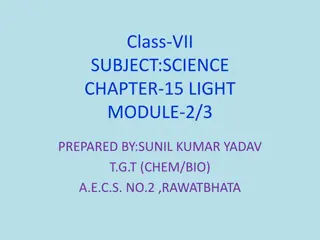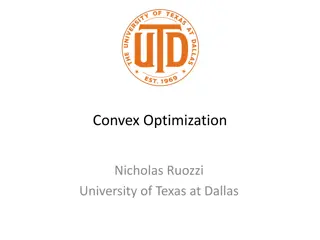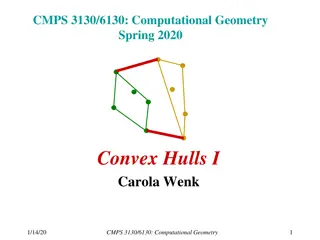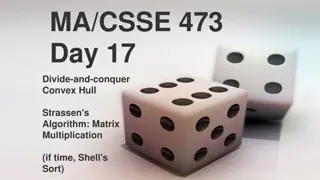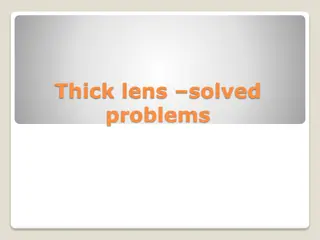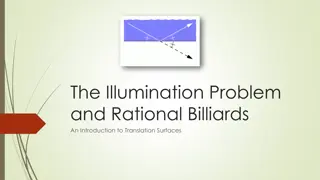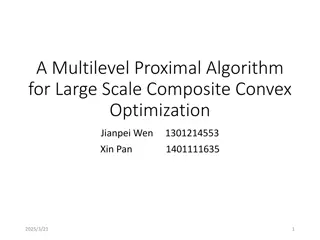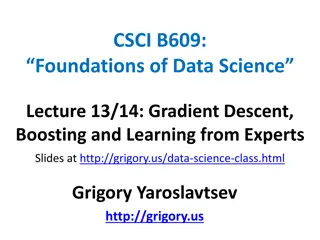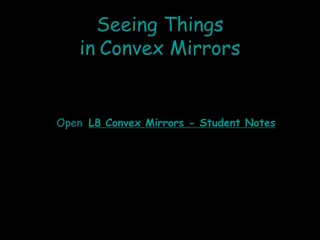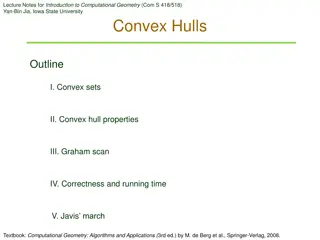Spherical Mirrors: Concave and Convex Types, Image Formation, and Practical Uses
Spherical mirrors, including concave and convex types, play a crucial role in reflecting light. By exploring the properties of concave and convex mirrors, understanding image formation, and discovering their diverse applications in daily life, we can grasp the significance of these mirrors in scienc
5 views • 9 slides
Understand Convex and Concave Functions in Mathematics
Learn about convex and concave functions in mathematics, including how to differentiate between them, identify their characteristics, and analyze gradients. Explore the concepts with practical examples and visual aids. Enhance your proficiency in answering questions related to convex and concave fun
4 views • 15 slides
Generalization of Empirical Risk Minimization in Stochastic Convex Optimization by Vitaly Feldman
This study delves into the generalization of Empirical Risk Minimization (ERM) in stochastic convex optimization, focusing on minimizing true objective functions while considering generalization errors. It explores the application of ERM in machine learning and statistics, particularly in supervised
6 views • 11 slides
Optimization Techniques in Convex and General Problems
Explore the world of optimization through convex and general problems, understanding the concepts, constraints, and the difference between convex and non-convex optimization. Discover the significance of local and global optima in solving complex optimization challenges.
4 views • 24 slides
Closest Pair and Convex Hull: Brute Force Approach
Closest Pair Problem in 2D involves finding the two closest points in a set by computing the distance between every pair of distinct points. The Convex Hull Problem determines the smallest convex polygon covering a set of points. Dr. Sasmita Kumari Nayak explains these concepts using a brute-force a
1 views • 15 slides
Convex Hulls in Computational Geometry
Convex hulls are a fundamental concept in computational geometry, representing the smallest convex shape that contains a set of points. The process involves defining the convexity of a set, determining the unique convex polygon, and computing the convex hull efficiently using algorithms. This conten
3 views • 9 slides
Algorithms: Convex Hull, Strassen's Matrix Multiplication, and More
Explore various divide-and-conquer algorithms including Convex Hull, Strassen's Matrix Multiplication, and Quickhull. Understand the concepts of Sorting, Closest Pairs, and Efficiency in algorithm design. Discover efficient techniques such as recursive calculations and simplifications to enhance alg
2 views • 20 slides
Insights into Recent Progress on Sampling Problems in Convex Optimization
Recent research highlights advancements in solving sampling problems in convex optimization, exemplified by works by Yin Tat Lee and Santosh Vempala. The complexity of convex problems, such as the Minimum Cost Flow Problem and Submodular Minimization, are being unraveled through innovative formulas
9 views • 47 slides
Convex Optimization: Interior Point Methods Formulation
This chapter on interior point methods in convex optimization explores the formulation of inequality-constrained optimization problems using barrier methods and generalized inequalities. It covers primal-dual interior point methods and discusses issues such as exponential complexity and determining
2 views • 24 slides
Links Between Convex Geometry and Query Processing
Delve into the intersection of convex geometry and query processing at Stanford University, where theoretical discussions are being applied to real-world database engine development. Learn about the optimization of database joins, the historical evolution of database engines, and the challenges face
3 views • 54 slides
Optics Solved Problems: How to Solve for Focal Lengths
This content provides solutions to various optics problems involving thick lenses, double convex lenses, bi-convex lenses, compound lenses, and more. It covers topics such as identifying principal and focal points, calculating image distances, determining the effective focal length of lens systems,
2 views • 12 slides
Advanced Subpath Algorithms for Convex Hull Queries
This study presents innovative algorithms for subpath convex hull queries, focusing on efficient computation of convex hulls for subpaths between two vertices on a simple path in the plane. The work includes a comparison with previous methods, showcasing improvements in space complexity and query pr
5 views • 19 slides
Convex Hulls in Computational Geometry
Convex hulls play a vital role in computational geometry, enabling shape approximation, collision avoidance in robotics, and finding smallest enclosing boxes for point sets. The convex hull problem involves computing the smallest convex polygon containing a set of points, with extreme points determi
6 views • 119 slides
Optimizing Multi-Party Video Conferencing through Server Selection and Topology Control
This paper proposes innovative methods for multi-server placement and topology control in multi-party video conferences. It introduces a three-step procedure to minimize end-to-end delays between client pairs using D-Grouping and convex optimization. The study demonstrates how combining D-Grouping,
3 views • 13 slides
General Framework of GAN
fGAN is a framework that evaluates the difference between two distributions by utilizing f-divergence, with f being a convex function. This concept can be understood through examples like KL divergence, Reverse KL divergence, and Chi-Square. Additionally, the Fenchel Conjugate method plays a crucial
4 views • 14 slides
Seeing Things in Convex Mirrors
This resource covers the principles of convex mirrors, detailing the characteristics of rays and their behavior when interacting with the mirror surface. It explains how incident rays parallel to the principal axis reflect as if they passed through the focal point, the effects of rays moving toward
1 views • 24 slides
Lenses & Mirrors: Observations & Explanations
Dive into the fascinating world of convex and concave lenses and mirrors to understand how they shape our perception of light and objects. Predict, observe, and explain the effects of shining light through different lenses, and discover the intriguing transformations when viewing objects through con
0 views • 6 slides
The Illumination Problem: Exploring Rational Billiards
Delve into the intriguing realm of the Illumination Problem and Rational Billiards, examining questions of illuminability from every point in a region and the fascinating world of translation surfaces. Discover different room types, from convex to non-convex, along with insights from renowned mathem
1 views • 23 slides
CSE203B Convex Optimization at UC San Diego
This course introduces Convex Optimization taught by CK Cheng at the University of California, San Diego. The course covers staff details, logistics, instructor information, textbook references, and tasks like homework and projects. It provides a comprehensive overview of the syllabus, class schedul
3 views • 15 slides
Convex Optimization: Theory & Applications in Engineering
Learn to solve convex optimization problems in engineering, statistics, finance, and more. Discover convex analysis, optimization algorithms, and practical applications in this math-intensive course with hands-on experience.
6 views • 8 slides
Convex Optimization Course Overview
This course covers recognizing and solving convex optimization problems in engineering, statistics, and more. Topics include convex sets, functions, analysis, and applications in various fields. Prerequisites include linear algebra, analysis, and familiarity with programming in Matlab, Python, or Ju
0 views • 8 slides
Convex Optimization Functions and Sets
Explore the concepts of convex functions and sets in Convex Optimization, including definitions, conditions of convexity, examples such as Softmax and Mutual Entropy, and their relation to convex sets. Learn about operations that preserve convexity, conjugate functions, log-concave/log-convex functi
2 views • 42 slides
Convex Optimization Project Outlines and Final Report
Explore the project outlines and final report for a Convex Optimization study by CK Cheng at the University of California, San Diego. Discover the problem statement, approaches, expected results, and references within the structured reports.
2 views • 4 slides
Convex Optimization Course at UC San Diego
Explore the CSE203B Convex Optimization course at the University of California, San Diego, taught by CK Cheng. Learn about the staff, instructor information, logistics, grading policy, textbooks, and course classification.
2 views • 12 slides
Convex Optimization Course at University of Pennsylvania
Join the ESE 605-001 course at University of Pennsylvania to learn about convex optimization and its applications in various fields. Explore topics like convex sets, functions, algorithms, and more with hands-on experience. Prerequisites include a strong foundation in math and familiarity with Matla
4 views • 8 slides
Convex Optimization Interior-Point Methods Summary
Explore Chapter 11 of Convex Optimization covering interior-point methods, barrier formulations, and generalized inequality problems. Dive into logarithmic barrier formulation, central path analysis, and the barrier method algorithm for solving optimization problems.
5 views • 24 slides
Multilevel Proximal Algorithm for Large-Scale Composite Convex Optimization
Explore the Multilevel Proximal Algorithm for optimizing large-scale composite convex functions. This paper discusses convergence rates, numerical experiments, and the extension of the multigrid framework for non-smooth cases. Learn about fine models, proximal update steps, and the MISTA algorithm f
3 views • 22 slides
Convex Optimization Lecture: Sets, Functions, and Problems
Explore the fundamentals of convex optimization, including sets, functions, and problem statements. Learn about convexity, basic convex sets, separating hyperplanes, and dual cones. Understand how to define convex functions and sets, and examine the specifications and properties of convex sets in op
1 views • 33 slides
Matrix Computations in Convex Optimization Lecture by Ying Yuan
Explore matrix computations in convex optimization through lecture slides covering key concepts, direct vs. iterative methods, error and residual analysis, and more at the University of California, San Diego.
1 views • 39 slides
Optimizing Constrained Convex Functions for Data Science Success
Explore the principles of constrained convex optimization, gradient descent, boosting, and learning from experts in the realm of data science. Unravel the complexities of non-convex optimization, knapsack problems, and the power of convex multivariate functions. Delve into examples of convex functio
0 views • 18 slides
Unconstrained Minimization in Convex Optimization
Explore Chapter 9 on Unconstrained Minimization in Convex Optimization, covering topics such as Taylor's Expansion, Descent Methods, Newton Method, and necessary conditions for optimality. Dive into scalar cases, examples, and bounds in vector cases.
6 views • 23 slides
Radiological Emergency Preparedness: ConvEx-2c Exercises Overview
Explore the ConvEx-2c Exercises focusing on preparation, performance, and outcomes related to a hypothetical radiological emergency. Learn how different stakeholders collaborate to ensure effective communication and response in such scenarios.
2 views • 17 slides
Exploring Optics Through Images
Discover a visual journey into the world of optics with images showcasing flat mirrors, convex and concave mirrors, as well as convex and concave lenses. Learn about Ray Tracing Lab, Flat Mirror, Convex Mirror, Concave Mirror, Convex Lens, and Concave Lens through detailed visuals.
11 views • 6 slides
Understand Convex Mirrors: Student Notes and Characteristics
Explore the characteristics of convex mirrors and learn how incident rays behave when interacting with them. Discover how to predict images formed in convex mirrors with detailed explanations and illustrations. Enhance your understanding of mirror optics through concise student notes and characteris
1 views • 24 slides
Introduction to Computational Geometry: Convex Hulls Overview
Explore the fundamentals of computational geometry with a focus on convex hulls. Learn about convex and concave sets, the properties and degenerate cases of convex hulls, the convex hull problem, and more. Delve into algorithms like Graham scan and Javis march for computing convex hulls efficiently.
2 views • 34 slides
Understanding Convex Optimization: Functions, Gradient, and Chain Rule
Explore the fundamentals of convex optimization, including function properties, gradients, chain rule, Jensen's inequality, first and second-order conditions. Learn about continuity, closed functions, derivatives, gradients, and the chain rule in convex functions theory.
2 views • 15 slides
Competitively Chasing Convex Bodies in Optimization Theory
Explore the intriguing concept of competitively chasing convex bodies in optimization theory. This research delves into the problem of selecting points within convex sets to minimize movement costs. Can deterministic algorithms compete with OPT, even when the latter anticipates the point selection i
2 views • 26 slides
Convex Optimization Fundamentals
Explore the key concepts in convex optimization, including definitions of convexity, conditions of optimality, operations that preserve convexity, and examples of convex functions and sets. Learn about log-concave and log-convex functions, conjugate functions, and different views of functions and hy
2 views • 37 slides
Convex Optimization and Dual Cone Support
Explore the concepts of convex optimization and dual cone support in the context of qualification, enumeration, and finding extreme points in a linear system of inequalities. Understand how the dimension and number of extreme points affect the determination of a system. Learn about the dual cone and
0 views • 19 slides
Introduction to Convex Hulls in Computational Geometry
Learn about convex sets, concave sets, convex hull properties, algorithms like Graham scan and Jarvis march, and the convex hull problem in computational geometry with practical examples and degenerate cases.
2 views • 34 slides
